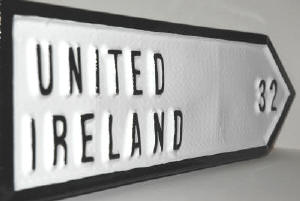di Liam Clarke

E, secondo il nuovo sondaggio, i voti di chi vorrebbero la rimozione del confine nei prossimi 20 anni salgono solo fino al 32%.
Significativamente, la percentuale della popolazione cattolica che gradisce l’unità, adesso o in 20 anni, resta comunque la minoranza assoluta, fermandosi a 48 Sì su 100 intervistati.
Alla popolazione del Nord è stato chiesto: “Se un referendum sul confine si tenesse il prossimo anno, come voteresti?”. Le opzioni fornite erano: “Sì”, “Sì, in 20 anni”, “No, manteniamo l’Irlanda del Nord” oppure “Nessun parere”.
Questo ha permesso ai sondaggisti di distinguere il supporto all’unità come una priorità politica immediata o cme ideale a lungo termine.
I protestanti si sono rivelati nettamente schierati contro l’unità irlandese, ma la popolazione cattolica era più divisa.
Solo il 7% dei cattolici vorrebbe subito l’unione con il Sud ed il 41% opterebbe per ottenerla in 20 anni. Quindi solo il 48% della popolazione cattolica.
La percentuale dei cattolici che non danno alcun parere sulla questione corrisponde al 14%.
Questo è un dato basso se comparato con le altre opzioni.
Se venissero ignorati chi non dà opinione, il 63% delle persone in Irlanda del Nord, tra cui il 44% dei cattolici, vorrebbero mantenere la separazione anche dopo il 2032.
In tutte le classi sociali e tra uomini e donne, il supporto per la rimozione del confine è inferiore al 14%.
Spesso è stato sostenuto da commentatori e da politici che se la popolazione cattolica diventasse maggioranza al Nord, superando in numero i protestanti, allora l’unità irlandese sarebbe inevitabile.
Questa ipotesi ha da sempre diviso “tribalmente” la politica locale per la maggior parte della storia dell’Irlanda del Nord.
Settario
I nuovi dati indicano che il modello di questo “conteggio settario” non è più del tutto valido.
Al contrario, un sostanziale numero di cattolici, quasi la metà, e la stragrande maggioranza dei protestanti (96%) vogliono mantenere lo status quo.
I risultati provengono da una vasta indagine commissionata dal Belfast Telegraph e realizzato dalla società di sondaggi LucidTalk.
Un altro studio, pubblicato dal Community Relations Council nel mese di febbraio, ha rilevato che i cattolici sono già la maggioranza della popolazione tra le persone di età inferiore ai 30 anni.
Nonostante ciò, la nuova indagine mostra che il supporto per l’unità irlandese è marginalmente più bassa nel gruppo tra i 18 e i 24 anni – il 36% rispetto al 37 della popolazione nel suo complesso.
Just 7pc in North want Ireland to be united
by Liam Clarke
And, according to a new poll, even when asked if they would vote to remove the Border in 20 years’ time, the figure increases only to 32pc.
Significantly, the proportion of the Catholic population that favours unity now or in 20 years is also a minority — just 48pc.
People in the North were asked: “If a Border referendum was held within the next year how would you vote?” They were given the options “Yes”, “Yes, in 20 years”, “No, keep Northern Ireland” and “No opinion”.
This allowed the pollsters to distinguish support for unity as an immediate political priority and as a longer-term ideal.
Protestants were overwhelmingly against Irish unity, but the Catholic population was more divided.
Just 7pc of Catholics would vote for it now and a further 41pc would opt for it in 20 years’ time, 48pc in all.
The proportion of Catholics offering no opinion on the issue matched the percentage in the population as a whole, 14pc.
This was a low opt-out rate compared with other questions.
If these ‘don’t knows’ are ignored, 63pc of people in Northern Ireland, including 44pc of Catholics, want Northern Ireland to remain a separate entity even after 2032.
Across all social classes and among both men and women, support for removing the Border now is below 14pc.
It is often argued by commentators and politicians that if the Catholic population ever replaces Protestants as the majority, then Irish unity will inevitably follow.
This assumption tribalised local politics for most of Northern Ireland’s history.
Sectarian
The new figures indicate that this ‘sectarian headcount’ model is no longer entirely valid.
Instead, a substantial minority of Catholics, nearly half, and an overwhelming majority of Protestants (96pc) favour the status quo.
The findings come from a major new survey commissioned by the ‘Belfast Telegraph’ and carried out by polling company LucidTalk.
Another study, published by the Community Relations Council in February, found that Catholics are already the majority population for people under the age of 30.
Despite this, the new survey shows that support for Irish unity is marginally lower in the 18-24-year-old group — 36pc compared with 37pc in the population as a whole.